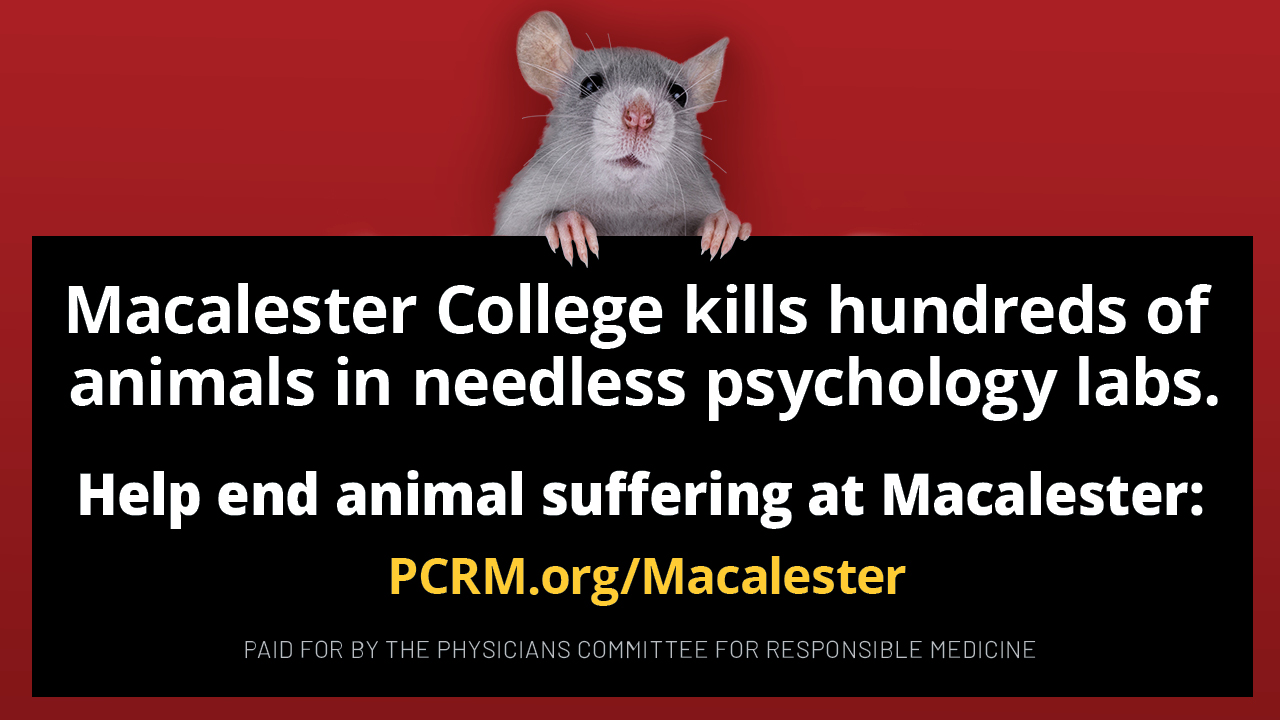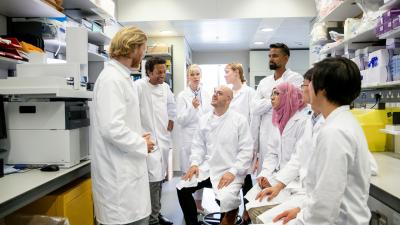Fresh Evidence Presented to Court: Macalester College Misleads, Pressures Students about Animal Use

ST. PAUL, Minn.—In a filing in Hennepin County Court, Oct. 10, 2025, Dr. Neal Barnard has presented fresh evidence that Macalester College’s psychology department is using misleading statements and pressuring students to participate in unnecessary animal experiments, a move that can harm students’ education and have a long-term psychological impact.
The new findings were presented in the case of Barnard v. Macalester College, originally filed in June, over allegations that the College was deceiving donors about its animal use. The case accuses the College of having killed thousands of animals to teach elementary concepts about learning, despite the ready availability of harmless alternatives and despite the College’s posted statements that it applies the highest ethical standards.
The filing cites Macalester’s most recent statements, published in the college newspaper, The Mac Weekly, on Sept. 25, 2025. According to the psychology department, the introductory psychology class “did not involve killing animals through experimentation” and “no rodents are killed during Introduction to Psychology courses,” apparently suggesting the animals would survive. What was left unsaid was the fact that the animals can be killed out of sight of the students by laboratory personnel.
The department also had disturbing words for students seeking to opt out of the animal laboratories, saying that doing so means missing an “irreplaceable experience that informs their future studies…something we consider essential preparation for future scientists and informed citizens alike.’” The statements would have the likely effect of pressuring students into participating in activities many find ethically unacceptable.
In a broadcast by the Association of Minnesota Public Educational Radio Stations, Aug. 5, 2025, a Macalester psychology student discussed her emotional reactions and those of a friend in response to the animal laboratory. As a result of the College’s behavior, she “asked to remain anonymous and feared she could get in trouble with the department.”
A recent survey showed that 83% of college students nationwide object to the use of animals when alternatives are available and the animals will be killed. Many of the surveyed students indicated they would participate in the animal laboratories anyway “to avoid problems” (20%), and others (24%) indicated they would be nervous asking for an alternative.
Leading universities, including Harvard, Yale, Stanford, Princeton, Duke, University of Michigan, University of Pennsylvania, and others, stopped using animals in psychology instruction many years ago. Local colleges, including Carleton, St. Olaf, St. John’s, Hamline, and the University of Minnesota, made the same shift, contradicting Macalester’s contention that animal laboratories are irreplaceable.
“Macalester’s curriculum is obsolete and potentially rough on students,” Dr. Barnard said. “Students do not need to experiment on animals, do not need to be pressured, and do not need to be misled. There are better methods, and the College should use them.”
Dr. Barnard graduated magna cum laude from Macalester in 1975, having majored in psychology. Learning that the College was still conducting out-of-date animal experiments 50 years later, he presented details to the College in 2024 on more modern teaching methods in use elsewhere. Believing the College was indeed examining ways of modernizing its instruction, Dr. Barnard raised money to support the school. However, Macalester President Suzanne Rivera abruptly terminated the curriculum discussions and directed Dr. Barnard to the College’s litigation attorneys.
The issue of coercing students into committing unethical acts was highlighted by Yale University’s Stanley Milgram, who instructed students to administer what they were told were electrical shocks to research participants, and most did so, despite believing that the shocks were painful and even potentially life-threatening. The resulting stress led some participants to complain directly to Milgram or to the university. Like Milgram’s experiments, the Macalester faculty is deceptive regarding the necessity of using animals and uses language to encourage participation. Unlike Milgram’s experiments, however, the harm to animals at Macalester is real, consisting of privation and chronic confinement beforehand and death afterward. Apart from the fact that negative emotions during the laboratory exercise interfere with learning, many students experience long-term stress and regret following participation in unnecessary animal laboratory exercises.
“Medical schools dropped animal labs from their curricula years ago, and the research world is following suit. Mac should, too,” Dr. Barnard said.
Dr. Barnard also says the College’s misleading descriptions of its animal laboratories run counter to American Psychological Association policy, which states:
“Psychologists responsible for education and training programs take reasonable steps to ensure that there is a current and accurate description of the program content (including participation in required course- or program-related counseling, psychotherapy, experiential groups, consulting projects, or community service), training goals and objectives, stipends and benefits, and requirements that must be met for satisfactory completion of the program. This information must be made readily available to all interested parties.”
Media Contact
Michael Keevican
202-527-7367
mkeevican[at]pcrm.org
Founded in 1985, the Physicians Committee for Responsible Medicine is a nonprofit organization that promotes preventive medicine, conducts clinical research, and encourages higher standards for ethics and effectiveness in education and research.







